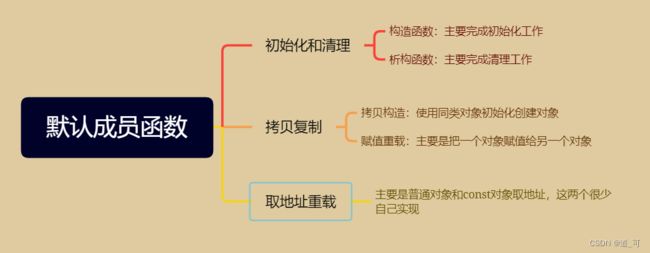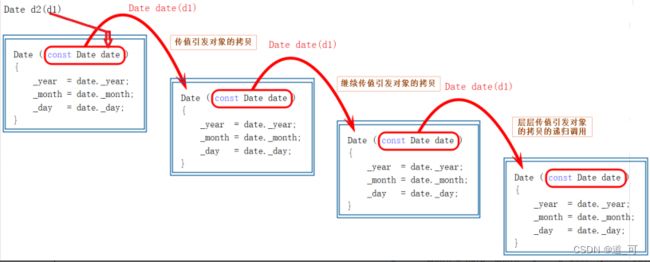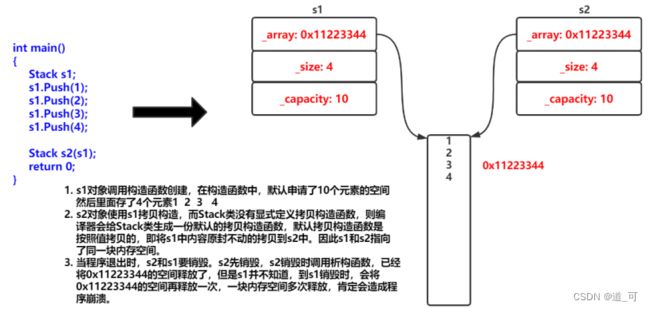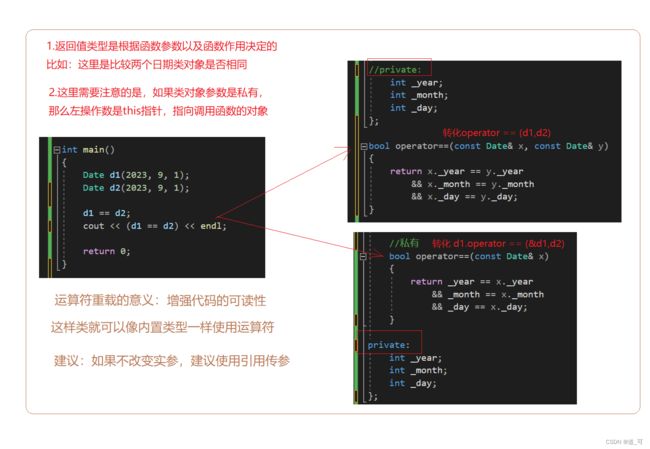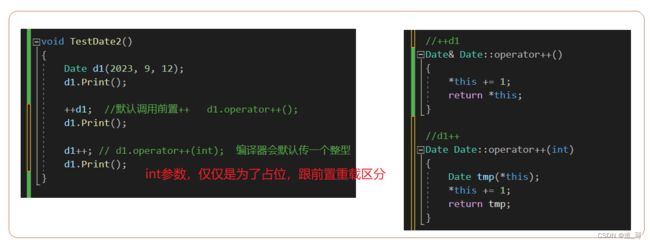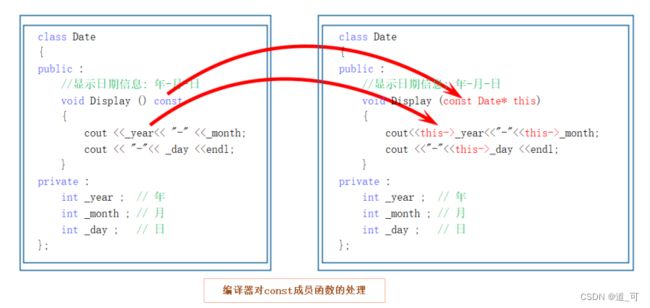(c++)类和对象中篇
目录
1. 类的6个默认成员函数
2. 构造函数
3. 析构函数
4. 拷贝构造函数
5. 赋值运算符重载
6. const成员函数
7. 取地址及const取地址操作符重载
1. 类的 6 个默认成员函数
- 如果一个类中什么成员都没有,简称为空类。
- 空类中真的什么都没有吗?并不是,任何类在什么都不写时,编译器会自动生成以下6个默认成员函数。
- 默认成员函数:用户没有显式实现,编译器会生成的成员函数称为默认成员函数。
2. 构造函数
2.1 概念
对于以下 Date 类:
class Date
{
public:
void Init(int year, int month, int day)
{
_year = year;
_month = month;
_day = day;
}
void Print()
{
cout << _year << "-" << _month << "-" << _day << endl;
}
private:
int _year;
int _month;
int _day;
};
int main()
{
Date d1;
d1.Init(2023, 9, 1);
d1.Print();
Date d2;
d2.Init(2023, 9, 1);
d2.Print();
return 0;
}
对于 Date 类,可以通过 Init 公有方法给对象设置日期,但如果每次创建对象时都调用该方法设置信息,未免有点麻烦,那能否在对象创建时,就将信息设置进去呢?
构造函数 是一个 特殊的成员函数,名字与类名相同 , 创建类类型对象时由编译器自动调用 ,以保证每个数据成员都有一个合适的初始值,并且在对象整个生命周期内只调用一次 。
2.2 特性
构造函数 是特殊的成员函数,需要注意的是,构造函数虽然名称叫构造,但是构造函数的主要任务并不是开空间创建对象,而是初始化对象 。
其特征如下:
- 1.函数名与类名相同。
- 2.无返回值。
- 3.对象实例化时编译器自动调用对应的构造函数。
- 4.构造函数可以重载。
class Date
{
public:
// 1.无参构造函数
Date()
{}
// 2.带参构造函数
Date(int year, int month, int day)
{
_year = year;
_month = month;
_day = day;
}
private:
int _year;
int _month;
int _day;
};
void TestDate()
{
Date d1; // 调用无参构造函数
Date d2(2023, 9, 1); // 调用带参的构造函数
// 注意:如果通过无参构造函数创建对象时,对象后面不用跟括号,否则就成了函数声明
// 以下代码的函数:声明了d3函数,该函数无参,返回一个日期类型的对象
// warning C4930: “Date d3(void)”: 未调用原型函数(是否是有意用变量定义的?)
Date d3();
}- 5. 如果类中没有显式定义构造函数,则C++编译器会自动生成一个无参的默认构造函数,一旦 用户显式定义编译器将不再生成。
class Date
{
public:
/*
// 如果用户显式定义了构造函数,编译器将不再生成
Date(int year, int month, int day)
{
_year = year;
_month = month;
_day = day;
}
*/
void Print()
{
cout << _year << "-" << _month << "-" << _day << endl;
}
private:
int _year;
int _month;
int _day;
};
int main()
{
// 将Date类中构造函数屏蔽后,代码可以通过编译,因为编译器生成了一个无参的默认构造函
数
// 将Date类中构造函数放开,代码编译失败,因为一旦显式定义任何构造函数,编译器将不再
生成
// 无参构造函数,放开后报错:error C2512: “Date”: 没有合适的默认构造函数可用
Date d1;
return 0;
}- 6. 关于编译器生成的默认成员函数,很多童鞋会有疑惑:不实现构造函数的情况下,编译器会 生成默认的构造函数。但是看起来默认构造函数又没什么用?d对象调用了编译器生成的默认构造函数,但是d对象_year/_month/_day,依旧是随机值。也就说在这里编译器生成的默认构造函数并没有什么用??
- C++把类型分成内置类型(基本类型)和自定义类型。内置类型就是语言提供的数据类 型,如:int/char...,自定义类型就是我们使用class/struct/union等自己定义的类型.
默认生成的构造函数:
- 内置类型成员不做处理
- 自定义类型成员会去调用它的默认构造函数
验证:
class Time
{
public:
Time()
{
cout << "Time()" << endl;
_hour = 0;
_minute = 0;
_second = 0;
}
private:
int _hour;
int _minute;
int _second;
};
class Date
{
private:
// 基本类型(内置类型)
int _year;
int _month;
int _day;
// 自定义类型
Time _t;
};
int main()
{
Date d;
return 0;
} 注意: C++11 中针对内置类型成员不初始化的缺陷,又打了补丁,即: 内置类型成员变量在 类中声明时可以给默认值 。
class Time
{
public:
Time()
{
cout << "Time()" << endl;
_hour = 0;
_minute = 0;
_second = 0;
}
private:
int _hour;
int _minute;
int _second;
};
class Date
{
private:
// 基本类型(内置类型)
int _year = 1970; //c++11允许的补丁
int _month = 1; //这里不是初始化,而是声明,给缺省值
int _day = 1; //给的是默认构造函数的缺省值
// 自定义类型
Time _t;
};
int main()
{
Date d;
return 0;
}- 7. 无参的构造函数和全缺省的构造函数都称为默认构造函数,并且默认构造函数只能有一个。
- 注意:无参构造函数、全缺省构造函数、我们没写编译器默认生成的构造函数,都可以认为是默认构造函数。
3. 析构函数
3.1 概念
析构函数:
- 与构造函数功能相反,析构函数不是完成对对象本身的销毁,局部对象销毁工作是由编译器完成的。而对象在销毁时会自动调用析构函数,完成对象中资源的清理工作。
3.2 特性
析构函数 是特殊的成员函数,其 特征 如下:
- 析构函数名是在类名前加上字符 ~。
- 无参数无返回值类型。
- 一个类只能有一个析构函数。若未显式定义,系统会自动生成默认的析构函数。注意:析构 函数不能重载
- 对象生命周期结束时,C++编译系统系统自动调用析构函数
- 编译器生成的默认析构函数,对自定类型成员调用它的析构函数。
- 如果类中没有申请资源时,析构函数可以不写,直接使用编译器生成的默认析构函数,比如 Date类;有资源申请时,一定要写,否则会造成资源泄漏,比如Stack类。
栈:
typedef int DataType;
class Stack
{
public:
Stack(size_t capacity = 3)
{
_array = (DataType*)malloc(sizeof(DataType) * capacity);
if (NULL == _array)
{
perror("malloc申请空间失败!!!");
return;
}
_capacity = capacity;
_size = 0;
}
void Push(DataType data)
{
//...
_array[_size] = data;
_size++;
}
~Stack()
{
free(_array);
//_array = nullptr;
//_capacity = _size = 0;
}
private:
DataType* _array;
int _capacity;
int _size;
};日期类对象:
class Date
{
public:
Date(int year = 2023, int month = 9, int day = 1)
{
_year = year;
_month = month;
_day = day;
}
//~Date()
//{
// //~Date()没有什么需要清理的
// cout << "~Date()" << endl;
//}
//内置类型析构函数不做处理
private:
int _year;
int _month;
int _day;
};自定义队列:
class MyQueue
{
public:
//...
private:
size_t _szie = 0;
Stack _st1;
Stack _st2;
};
关于以上三个函数的调用:
由此也可以总结出析构函数的特点:
a.内置类型不做处理
b.自定义类型成员会去调用它的析构函数
4. 拷贝构造函数
拷贝构造函数 : 只有单个形参 ,该形参是对本 类类型对象的引用 ( 一般常用 const 修饰 ) ,在用 已存 在的类类型对象创建新对象时由编译器自动调用 。
特征
拷贝构造函数也是特殊的成员函数,其 特征 如下:
- 1. 拷贝构造函数是构造函数的一个重载形式。
- 2. 拷贝构造函数的参数只有一个且必须是类类型对象的引用,使用传值方式编译器直接报错, 因为会引发无穷递归调用。
class Date
{
public:
Date(int year = 1900, int month = 1, int day = 1)
{
_year = year;
_month = month;
_day = day;
}
Date(const Date& d) //拷贝构造函数
{
_year = d._year;
_month = d._month;
_day = d._day;
}
private:
int _year;
int _month;
int _day;
};
int main()
{
Date d1;
Date d2(d1);
return 0;
}- 3. 若未显式定义,编译器会生成默认的拷贝构造函数。 默认的拷贝构造函数对象按内存存储按字节序完成拷贝,这种拷贝叫做浅拷贝,或者值拷贝。
注意:在编译器生成的默认拷贝构造函数中,内置类型是按照字节方式直接拷贝的,而自定
义类型是调用其拷贝构造函数完成拷贝的。
class Time
{
public:
Time()
{
_hour = 1;
_minute = 1;
_second = 1;
}
Time(const Time& t)
{
_hour = t._hour;
_minute = t._minute;
_second = t._second;
cout << "Time::Time(const Time&)" << endl;
}
private:
int _hour;
int _minute;
int _second;
};
class Date
{
private:
// 基本类型(内置类型)
int _year = 2023;
int _month = 1;
int _day = 1;
// 自定义类型
Time _t;
};
int main()
{
Date d1;
// 用已经存在的d1拷贝构造d2,此处会调用Date类的拷贝构造函数
// 但Date类并没有显式定义拷贝构造函数,则编译器会给Date类生成一个默认的拷贝构
造函数
Date d2(d1);
return 0;
} 4. 编译器生成的默认拷贝构造函数已经可以完成字节序的值拷贝了 ,还需要自己显式实现吗?
当然像日期类这样的类是没必要的。那么下面的类呢?验证一下试试?
// 这里会发现下面的程序会崩溃掉。
typedef int DataType;
class Stack
{
public:
Stack(size_t capacity = 10)
{
_array = (DataType*)malloc(capacity * sizeof(DataType));
if (nullptr == _array)
{
perror("malloc申请空间失败");
return;
}
_size = 0;
_capacity = capacity;
}
void Push(const DataType& data)
{
// ...
_array[_size] = data;
_size++;
}
~Stack()
{
free(_array);
}
private:
DataType *_array;
size_t _size;
size_t _capacity;
};
int main()
{
Stack s1;
s1.Push(1);
s1.Push(2);
s1.Push(3);
s1.Push(4);
Stack s2(s1);
return 0;
} 注意:类中如果没有涉及资源申请时,拷贝构造函数是否写都可以;一旦涉及到资源申请时,则拷贝构造函数是一定要写的,否则就是浅拷贝。
5. 赋值运算符重载
C++ 为了增强代码的可读性引入了运算符重载 , 运算符重载是具有特殊函数名的函数 ,也具有其返回值类型,函数名字以及参数列表,其返回值类型与参数列表与普通的函数类似。
- 简单来说就是:内置类型可以直接使用运算符运算,因为编译器知道如何运算,而自定义类型无法直接使用运算符,因为编译器不知道如何运算,所以如果要支持自定义类型使用运算符,需要自己实现运算符重载
- 函数名字为:关键字operator后面接需要重载的运算符符号。
- 函数原型:返回值类型 operator操作符(参数列表)
注意:
- 不能通过连接其他符号来创建新的操作符:比如operator@
- 重载操作符必须有一个类类型参数
- 用于内置类型的运算符,其含义不能改变,例如:内置的整型+,不 能改变其含义
- 作为类成员函数重载时,其形参看起来比操作数数目少1,因为成员函数的第一个参数为隐藏的this
- .* :: sizeof ?: . 注意以上5个运算符不能重载。
以日期类对象为例:
class Date
{
public:
Date(int year = 2023, int month = 1, int day = 1)
{
_year = year;
_month = month;
_day = day;
}
//私有
// bool operator==(Date* this, const Date& d2)
// 这里需要注意的是,左操作数是this,指向调用函数的对象
bool operator==(const Date& x)
{
return _year == x._year
&& _month == x._month
&& _day == x._day;
}
//private:
int _year;
int _month;
int _day;
};
//公有
bool operator==(Date x, Date y)
{
return x._year == y._year
&& x._month == y._month
&& x._day == y._day;
}
int main()
{
Date d1(2023, 9, 1);
Date d2(2023, 9, 1);
d1 == d2;
cout << (d1 == d2) << endl;
return 0;
}
-------------------------------------------------------------------------------------------------------------------
依旧以日期类为例:
1.复用逻辑
2.请问下面代码为什么要有返回值?为什么要传引用返回?
返回值是为了支持连续赋值,保持运算符的特性,类似于a = b = c 。d2 = d1 ; d3 = d2 = d1 ;
传引用返回是因为this指针出函数作用域后会销毁
3.赋值重载与拷贝构造的区别
4.日期类 + 与 +=
5.关于日期类的前置++与后置++
日期类案例声明:
#pragma once
#include
using namespace std;
class Date
{
//友元
friend ostream& operator<<(ostream& out, const Date& d); //流插入
friend istream& operator>>(istream& in, Date& d);//流提取
public:
Date(int year = 2023, int month = 1, int day = 1);
void Print();//打印
int GetMonthDay(int year, int month) const;//获取每月的天数
bool operator==(const Date& x) const;
bool operator!=(const Date& x) const;
bool operator<(const Date& x) const;
bool operator<=(const Date& x) const;
bool operator>(const Date& x) const;
bool operator>=(const Date& x) const;
Date& operator+=(int day);
Date operator+(int day) const;
//减不仅构成运算符重载,还构成函数重载
//d1 - 100 日期 - 天数
Date operator-(int day) const;
Date& operator-=(int day);
//d1 - d2 日期 - 日期
int operator-(const Date& d);
//++d1
Date& operator++();
//d1++
Date operator++(int);
//--d1 -> d1.operator--();
Date& operator--();
//d1-- -> d1.operator--(int);
Date operator--(int);
//void operator<<(ostream& out);
private:
int _year;
int _month;
int _day;
};
ostream& operator<<(ostream& out, const Date& d);//流插入
istream& operator>>(istream& in, Date& d);//流提取
日期类案例实现:
#include"Date.h"
int Date::GetMonthDay(int year, int month) const
{
static int days[13] = { 0, 31, 28, 31, 30, 31, 30, 31, 31, 30, 31, 30,31 };
if (month == 2 && (((year % 400 == 0) || (year % 4 == 0)) && (year % 100 != 0)))
{
return 29;
}
else
{
return days[month];
}
}
Date::Date(int year , int month , int day )
{
if (month > 0 && month < 13 &&
(day > 0 && day <= GetMonthDay(year, month)))
{
_year = year;
_month = month;
_day = day;
}
else
{
cout << "日期非法" << endl;
}
}
void Date::Print()
{
cout << _year << "/" << _month << "/" << _day << endl;
}
bool Date::operator==(const Date& x) const
{
return _year == x._year
&& _month == x._month
&& _day == x._day;
}
bool Date::operator!=(const Date& x) const
{
return !(*this == x);
}
bool Date::operator<(const Date& x) const
{
if (_year < x._year)
{
return true;
}
else if (_year == x._year && _month < x._month)
{
return true;
}
else if (_year == x._year && _month == x._month && _day < x._day)
{
return true;
}
else
{
return false;
}
}
bool Date::operator<=(const Date& x) const
{
return *this < x || *this == x;
}
bool Date::operator>(const Date& x) const
{
return !(*this <= x);
}
bool Date::operator>=(const Date& x) const
{
return !(*this < x);
}
Date& Date:: operator+=(int day)
{
if (day < 0) //day为负数
{
*this -= -day;
return *this;
}
_day += day;
while (_day > GetMonthDay(_year, _month))
{
//减去多余的天数
_day -= GetMonthDay(_year, _month);
//月进位
_month++;
//年进位
if (_month==13)
{
_month = 1;
_year++;
}
}
return *this;
}
//+ 复用+=
Date Date :: operator+(int day) const
{
Date tmp(*this);
tmp += day;
return tmp;
}
//Date Date :: operator+(int day)
//{
// Date tmp(*this);
//
// tmp._day += day;
//
// while (tmp._day > GetMonthDay(tmp._year, tmp._month))
// {
// //减去多余的天数
// tmp._day -= GetMonthDay(tmp._year, tmp._month);
//
// //月进位
// tmp._month++;
//
// //年进位
// if (tmp._month == 13)
// {
// tmp._month = 1;
// tmp._year++;
// }
// }
//
// return tmp;
//}
//+= 复用+
//Date& Date::operator+=(int day)
//{
// *this = *this + day;
//
// return *this;
//}
//++d1
Date& Date::operator++()
{
*this += 1;
return *this;
}
//d1++
Date Date::operator++(int)
{
Date tmp(*this);
*this += 1;
return tmp;
}
Date& Date::operator-=(int day)
{
if (day < 0) //day为负数
{
*this += -day;
return *this;
}
_day -= day;
while (_day <= 0)
{
--_month;
if (_month == 0)
{
--_year;
_month = 12;
}
_day += GetMonthDay(_year, _month);
}
return *this;
}
Date Date::operator-(int day) const
{
Date tmp(*this);
tmp -= day;
return tmp;
}
//--d1
Date& Date::operator--()
{
*this -= 1;
return *this;
}
//d1--
Date Date::operator--(int)
{
Date tmp(*this);
*this -= 1;
return tmp;
}
//d1 - d2
int Date::operator-(const Date& d)
{
Date max = *this;
Date min = d;
int flag = 1;
if (*this < d)
{
max = d;
min = *this;
flag = -1;
}
int count = 0;
while (min != max)
{
++min;
++count;
}
return count * flag;
}
//void Date::operator<<(ostream& out)
//{
// cout << _year << "年" << _month << "月" << _day << "日" << endl;
//}
ostream& operator<<(ostream& out, const Date& d)
{
cout << d._year << "年" << d._month << "月" << d._day << "日" << endl;
return out;
}
istream& operator>>(istream& in, Date& d)
{
in >> d._year >> d._month >> d._day;
return in;
}
6. const 成员函数
将 const 修饰的 “ 成员函数 ” 称之为 const 成员函数 , const 修饰类成员函数,实际修饰该成员函数 隐含的 this 指针 ,表明在该成员函数中 不能对类的任何成员进行修改。
7. 取地址及 const 取地址操作符重载
这两个默认成员函数一般不用重新定义 ,编译器默认会生成。
class A
{
public:
//const 修饰 *this
//this指针的类型变成 const A*
//内部不改变成员变量的成员函数,最好加上const,const对象和普通对象(权限的缩小)都可以调用
void Print() const
{
cout << _a << endl;
}
A* operator&()
{
return this;
}
const A* operator&() const
{
return this;
}
private:
int _a = 10;
};
void Func(const A& x)
{
x.Print();
cout << &x << endl;
}
int main()
{
A aa;
aa.Print();
Func(aa);
cout << &aa << endl;
return 0;
} 这两个运算符一般不需要重载,使用编译器生成的默认取地址的重载即可,只有特殊情况,才需要重载,比如想让别人获取到指定的内容!
概念性内容均来自比特科技
